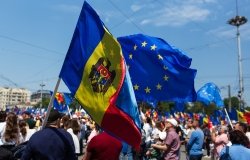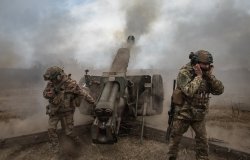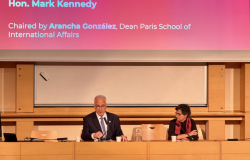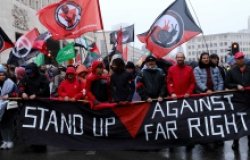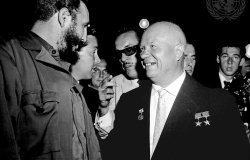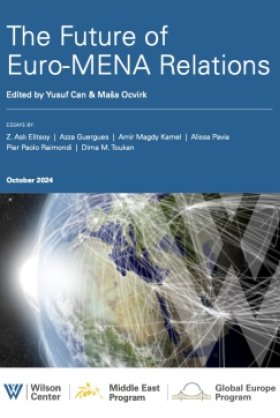187. Milosevic: Has NATO's Policy Rendered this Chief Impediment to Peace, Stronger?
Ten years ago, when we returned to Belgrade to report on the Balkans, Yugoslavia was a place with a future. It seemed best positioned to make the jump from communist dictatorship to democracy. Marshall Tito had made it the freest communist country in Eastern Europe. Under Tito, Yugoslavs had been allowed to travel, work abroad and had other personal freedoms, provided they did not criticize Tito or provoke nationalism. The late New York Times correspondent, Cy Sulzberger, stated at the time: "Sure, Tito is a Marxist. But his dogma is that of Groucho, not Marx."
Slobodan Milosevic, as is shown in our recent book, first wanted to be Tito. He even started wearing white summer suits like the debonair Tito and exchanged his cigarillos for Tito- style Havana cigars. But Milosevic was not Tito.
Ironically, after 12 years in power, Milosevic has left a greater imprint on his time than Tito. And he dragged the United States and Europe, albeit unwillingly, into the mess he has created in four wars in Slovenia, Croatia, Bosnia and Kosovo. In Bosnia, Macedonia, Serbia and Kosovo, all former Yugoslav republics, the United States, Britain and other countries have undertaken a practically open-ended commitment to keep the peace. Apart from the military expenditures - which run into the billions of dollars annually - substantial economic costs are involved.
The stated aim of the Western governments is to remove Slobodan Milosevic, indicted war criminal. Until he is gone, the argument runs, Serbia, ex-Yugoslavia, indeed the whole of the Balkans will be unstable. It seemed a simple matter. After three months of NATO bombing earlier this year, the Serbian people were expected to see the light, rise up against their hated dictator and remove him. Democracy would rush in. To give them an extra push, aid or reconstruction would be withheld until Milosevic is out of power.
Unfortunately, this has not happened and it raises the key question: have we seriously misread Milosevic and also the Serbian people? We believe so. What may seem rational from the outside - to policymakers in Washington and London - is not necessarily going to work. To be on the ground in Milosevic's Serbia is to enter another world, echoing an Alice-in-Wonderland sort of place. Milosevic remains in power through many skillful manipulations of the system, including those of the television and his police force. Serbia boasts one policeman for every 100 citizens, one of the highest ratios in the world.
The lies his media puts out may seem shameless to the outside world but they create a reality that has become normality within Serbia. Most currently, Milosevic's media has been accusing paramilitaries and thugs in Kosovo - not his army - of carrying out the killings unleashed by his ethnic cleansing campaign. Earlier, he made the same claims of atrocities in Bosnia and Croatia. His recent lies and propaganda have also given him the excuse to carry out a wave of arrests - including of some people he said had been hired by French intelligence to assassinate him.
Currently, Milosevic is waiting for the next American president. He has been telling his recent visitors that a Bush or any other administration would start off with a different agenda. Saddam Hussein after all is still in power. Perhaps Milosevic is right. The attention span of Western democracies can be rather short.
Even if his calculations are not right, he has to be able to tell his people that changes are imminent. He certainly does not intend to give up power. Where would he go? If he remains in Serbia, but not as its leader, his many enemies will make sure he is eliminated. If he leaves Serbia, he can be sent to the Hague to face war crimes charges. Staying in power is all that matters to him. Western policies have only made this more imperative for him. Hence, if we would like to see him removed, we should think about other ways of dislodging him - since the current method of sanctions and name-calling does not seem to be working.
With respect to the Serbian people, NATO has unexpectedly helped Milosevic keep control. People in Serbia dislike Milosevic and his hated wife Mira Markovic, whom they refer to as the Red Witch or Red Queen. There are lots of indicators. But they equally dislike NATO because this is the alliance which bombed them. There is no clear focus for their discontent and no clear alternative to Milosevic. They are in no mood to rise up and overthrow him, particularly in a time of economic deprivation in which the average salary is around $45.00 a month.
In the past, it could have been different. In sporadic demonstrations beginning in 1991 through the winter of 1996-1997, led mainly by young people, there was a real push for change and democratization. A popular chant at demonstrations likened Milosevic's fate to that of Romania's dreaded dictator, Nicolae Ceausescu: "Slobo, Slobo, neka, neka, Ceausescu tebe ceka" (Slobo, just you see, Ceausescu is waiting for you). The United States and West European countries were held up as the ideal.
Currently, an estimated 100,000 to 300,000 of the best and brightest young people have left. The educated, informed men and women once in high positions of the government, are no longer there. Milosevic has brought a gangster class to power. At the grass roots level, people in Serbia feel disillusioned and disheartened. They also feel demonized and punished by NATO. Their mythology of victimization has been reinforced.
Meanwhile, Milosevic has grown stronger.
A big question should now be asked. Is the present policy of isolation and sanctions going to achieve Milosevic's removal from power? Sanctions have certainly not removed Cuba's Fidel Castro, Libya's Muammar Qadhafi or Iraq's Saddam Hussein. What if Milosevic, like them, still rules over his repressed and impoverished people years from now? He once told Milan Panic, the President of ICN Pharmaceuticals and former Prime Minister of Yugoslavia, in a drunken moment: "I am the Ayatollah Khomeini of the Serbs. They will follow me anywhere!"
This question increasingly involves European countries. Serbia is in Western Europe's backyard. Its isolation is damaging, particularly in the immediate neighborhood. Danube traffic has been halted by bombed bridges, there is no direct trade. Transit routes between Europe and the Middle East, which pass through Serbia, no longer function.
In the absence of the Cold War, it was a great feat to hold NATO together during the bombing campaign. That unity is crumbling fast over what to do now. Several Western European countries like Italy, Greece, Austria, Germany, France and the Scandinavian countries would like to send humanitarian and other aid to Serbia and reconstruct Danube bridges.
Britain, America's chief ally in Europe, holds America's hardline. But the splits could become wide and quite damaging by next summer.
There are however, other ominous problems which even President Clinton alluded to when he visited Kosovo last week. The Albanians in Kosovo have become so radicalized that there is now ethnic cleansing going on in reverse. Some estimates even place the number of Serbs killed by Albanians in Kosovo as reaching the number of Albanians killed by Serbs before the NATO bombing began.
What looms now is a very real possibility of a new war in the Balkans. The chief threats include a future Albanian push for a Greater Albania - a union with Kosovo, Albania proper and parts of Macedonia. Other problems include Milosevic making mischief in Montenegro, Vojvodina or the Sandjak.
What is needed now is some more imaginative thinking about Milosevic and the region, taking into account his psychology and the reality on the ground. He should be manipulated, with thought to long-term goals, not short-term punishment. Some ideas are out there. A new Berlin conference redrawing borders, for example; involving such organizations as the Soros Foundation to help build a civil society. Perhaps even constructive engagement like America's relationship with China even after the brutalities of Tiananmen Square.
What is for certain is that Slobodan Milosevic is not a man to go quietly. He is the Saddam Hussein of Europe, doomed to wreak havoc and go to war - as he has done repeatedly already - in order to preserve his own power and distract his people's attention from repression and poverty. As long as he remains, he will be an impediment to stability in the Balkans. In little more than a decade, he has brought post-Cold War Europe back to the matters that dominated the beginning of the twentieth century and which led to World War I. In the process, he has brought uncertainty to Europe at the dawn of the twenty-first century. We should evolve a more thoughtful and effective approach based on an understanding of the man and the peoples of the region. Otherwise, we dread to think what late twenty-first century historians will be writing.
Louise Branson and Dusko Doder spoke at an EES Noon Discussion on December 1, 1999

Global Europe Program
The Global Europe Program is focused on Europe’s capabilities, and how it engages on critical global issues. We investigate European approaches to critical global issues. We examine Europe’s relations with Russia and Eurasia, China and the Indo-Pacific, the Middle East and Africa. Our initiatives include “Ukraine in Europe” – an examination of what it will take to make Ukraine’s European future a reality. But we also examine the role of NATO, the European Union and the OSCE, Europe’s energy security, transatlantic trade disputes, and challenges to democracy. The Global Europe Program’s staff, scholars-in-residence, and Global Fellows participate in seminars, policy study groups, and international conferences to provide analytical recommendations to policy makers and the media. Read more

